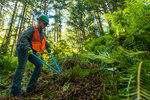
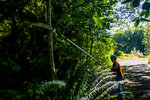
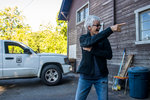
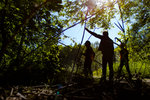
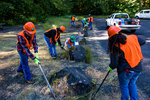
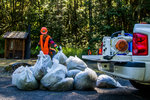
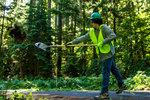
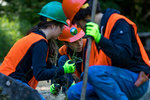
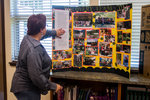
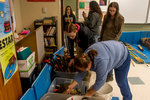
Miles deep in the Gifford Pinchot National Forest, a crew of workers is busy clearing overgrowth from a narrow road winding through the woods. Clad in safety vests and hard hats, they’re fanned out on the steep slopes along each side of the road, some cutting brush, others sweeping the pavement clear.
Not far away, another crew is buzzing around a trailhead, trimming overhanging branches and uprooting tall grass that has encroached a parking area. Look closely, and you’ll notice that these workers aren’t rangers — they’re teenagers, White Pass and Morton students who are the Forest Service’s secret weapon for five weeks each summer.
The Discovery Team, as the program is known, has been providing 28 students with jobs in the national forest each summer since 2000. The kids get valuable experience, and the cash-strapped Forest Service makes a dent in its backlog of projects.
“They’re not just learning how to cut a branch down,” said USFS forestry technician Debbie Hogoboom as a pair of students took turns wielding a pole saw last Wednesday.
She talked about the lessons her charges learn about leadership, teamwork, safety and professionalism. Each morning, Hogoboom briefs the students — who are divided into four teams of seven — about the tasks ahead for the day. They could include installing new picnic tables, constructing steps on trails or mixing concrete. Students learn how to use tools like power drills, sledgehammers, loppers and Pulaskis.
Hogoboom talks through the safety concerns of each task and integrates games like “name that species” as the students move around the worksite. She provides detailed explanations about why each job is important, rather than just instructing the students on how to do it. At the trailhead, she noted that the tall grass could become a fire hazard if visitors carelessly toss aside cigarette butts after it dries out. The program’s backers say it’s care like this that makes Discovery Team so valuable for the students.
“A lot of the kids that did work for me got jobs immediately, and they always had good references,” said Debbie Layman, the program coordinator with the White Pass School District. “[Employers] know that if they’ve done Discovery Team, they’re really excited to hire them.”
It’s not just the work ethic they learn, the dirt and sweat they accumulate each day. Discovery Team requires them to submit a cover letter, references and resume, to show up professionally dressed for a formal interview. That process isn’t designed to weed out applicants, but to give them their first taste of what they might face in the workforce. That’s no small thing when summer job opportunities can be in short supply in East Lewis County.
“You’d have to drive over an hour to get to a McDonald’s,” noted Bryan DeLong, a White Pass High School teacher who has been a Discovery Team crew leader for 12 years.
The benefit of that experience is borne out in alums like Hanna Jeter, who has spent nine seasons on maintenance crews with the National Park Service on Mount Rainier.
“Discovery Team helped me create a resume,” said Jeter, who did two summers with the program as a 13- and 14-year-old. “With the Park Service, your resume really has to back up the survey questions they ask you during the process. A lot of the things I needed for the job were on my resume because of Discovery Team. … We actually do a lot of similar stuff [in the national park]. It’s very reminiscent of some of the campground work I did with Discovery Team.”
The Forest Service has also hired on program alums after graduation, said recreation planner and wilderness manager Andrea Durham.
“A lot of them are surprised at how much they enjoy digging in the dirt or getting eaten up by bugs,” she said. “We end up hiring some of them. … They go on to do good things.”
Hogoboom, who graduated from White Pass herself and has spent her whole life in East Lewis County, said many local kids grow up unaware of the outdoors opportunities all around them.
“Some kids who’ve never been exposed to the woods are now seeing what their community — outside of Highway 12 — is all about,” she said.
DeLong added that being in a new environment allows students to take on different roles and interact outside their normal cliques.
“It takes us outside of the school into the surrounding area,” he said. “It reconnects us with our home.”
Emily Adams, who graduated from White Pass High School this spring, is in her third year on Discovery Team, serving as an assistant crew leader this year. She loves the iconic views from working at places like Mount St. Helens, but she also surprised herself with how much she enjoyed the dirty work — and how it brought her closer to her classmates.
“It’s really satisfying to clean out the culverts and see the water flowing through where it wasn’t before,” said Adams, who will be attending Central Washington University in the fall. “After going out on the job and working together and getting dirty and shoveling in the mud and getting exhausted, it’s a bonding experience.”
The program, which comes with an annual cost of about $60,000, is funded from a variety of sources. About half of the money comes from retained receipts, which are funds from Forest Service stewardship contracts that can be set aside for future work. Another portion is paid for by the Secure Rural Schools funds set aside for Lewis County projects in the national forest. The Pacific Mountain Workforce Development Council also contributes to the program.
At the end of each summer, each Discovery Team crew puts together a poster board and presentation detailing the work they accomplished, complete with before and after pictures. They throw a party, inviting the Forest Service as well, to celebrate and look back on what they’ve done.
Jeter recalled being inspired by working at sites like Windy Ridge on Mount St. Helens. Layman said last year’s team completed a trail restoration project that involved hauling cement blocks almost a mile into the forest.
“They’re always shocked,” she said. “So much is accomplished.”
Hogoboom, who often picks out the projects the students end up taking on, is perhaps more aware than anyone of what their work means to Pinchot.
“Because we’re so shorthanded, we don’t have the funds to hire summer workers,” she said. “Without their help and support, these type of cleanup projects don’t get done. … We would get behind.”
Durham agreed that Discovery Team is valuable to the agency, but added that the checklist of finished work is just complementary to giving students opportunities.
“There’s no question that we should be doing it,” she said. “They are getting life skills, and they’re learning how to work as a member of a team, how to show up on time, how to interview for a job. It’s absolutely worth the investment.”